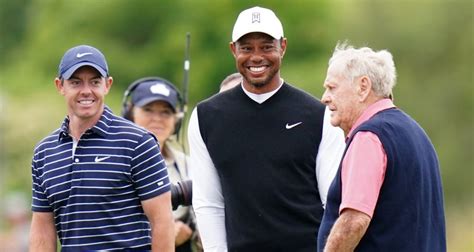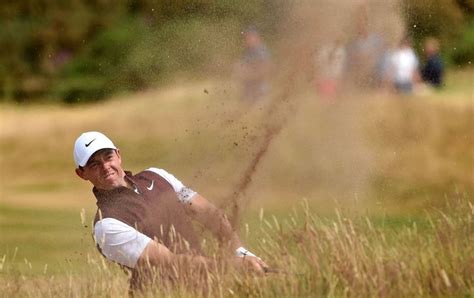
Rory McIlroy’s talent warrants more major championship victories than he currently possesses, according to golf legend Jack Nicklaus, who believes the Northern Irishman’s potential has not been fully realized.
Jack Nicklaus, an 18-time major champion, recently voiced his opinion on Rory McIlroy’s career trajectory, suggesting that the 35-year-old should have amassed a larger collection of major titles given his exceptional skill set. Speaking on the matter, Nicklaus stated, “I think Rory is an unbelievable talent. He’s got probably as much talent as anybody who’s ever played the game. He’s won four major championships, but I think he should have won more. I don’t know why he hasn’t won more.” Nicklaus’s comments have ignited discussions within the golf community regarding McIlroy’s performance under pressure and his ability to close out major tournaments.
McIlroy, a former world number one, has been one of the most prominent figures in golf over the past decade. His impressive career includes four major championships: the 2011 U.S. Open, the 2012 PGA Championship, and the 2014 Open Championship and PGA Championship. Despite these victories, McIlroy’s quest for a fifth major has been ongoing since 2014, a drought that has led to considerable scrutiny and analysis. Nicklaus’s remarks add to the existing narrative surrounding McIlroy’s potential and perceived underachievement in the major championships arena.
Nicklaus’s assessment of McIlroy’s career is rooted in the observation of McIlroy’s comprehensive skill set. McIlroy possesses a powerful and accurate driving game, exceptional iron play, and a deft touch around the greens. These attributes have allowed him to dominate tournaments and achieve remarkable success, including multiple Ryder Cup appearances and victories, as well as holding the top spot in the world rankings for an extended period. However, his inability to consistently translate these skills into major championship victories has become a talking point.
One of the key factors often cited in discussions about McIlroy’s major drought is his performance in pressure situations. Throughout his career, McIlroy has occasionally struggled to maintain his composure and execute under the intense scrutiny that accompanies major championships. This has led to costly mistakes and missed opportunities, preventing him from adding to his major tally. Instances of this include final-round struggles at the Masters Tournament, where he has been in contention on several occasions but has failed to secure the coveted green jacket.
Another element contributing to McIlroy’s major drought is the increasing competitiveness of the professional golf landscape. The emergence of new talents, such as Jon Rahm, Scottie Scheffler, and Viktor Hovland, has created a deeper pool of contenders capable of winning major championships. This increased competition makes it more challenging for any single player to consistently dominate the major tournaments. McIlroy’s peers are equally driven and talented, raising the bar for success in the sport.
The mental aspect of golf is also crucial in determining success, particularly in major championships. The pressure and intensity of these tournaments require players to maintain unwavering focus and resilience. McIlroy has openly discussed the mental challenges he faces, acknowledging the need to improve his mental fortitude and strategies for managing pressure. Overcoming these mental barriers is seen as essential for him to break his major drought and fulfill his potential.
McIlroy’s pursuit of a career grand slam has added an extra layer of pressure. The Masters Tournament is the only major championship that has eluded him, and his repeated attempts to win at Augusta National have been met with disappointment. This quest has become a significant narrative in his career, and the weight of expectations has likely impacted his performance.
Despite the criticisms and challenges, McIlroy remains a formidable force in professional golf. His talent and determination are undeniable, and he continues to be a consistent contender in major championships. He has shown resilience in the face of setbacks and has demonstrated a commitment to improving his game. With the right approach and mindset, McIlroy has the potential to add more major titles to his resume.
Nicklaus’s comments serve as both a critique and a motivation for McIlroy. The acknowledgment of his immense talent underscores the belief that he is capable of achieving more. This vote of confidence from one of the greatest golfers of all time can serve as a catalyst for McIlroy to redouble his efforts and focus on achieving his full potential.
The insights from Nicklaus also highlight the importance of strategic adjustments. McIlroy may need to refine his approach to major championships, focusing on managing pressure, making smarter decisions, and maintaining consistency throughout the tournament. This could involve working closely with his team to develop strategies tailored to the specific challenges of each major venue.
The support of fans and the golf community can also play a significant role in McIlroy’s success. Positive encouragement and belief in his abilities can help him overcome mental barriers and maintain a positive mindset. McIlroy’s popularity and charisma have made him a fan favorite, and his connection with the audience can be a source of strength.
Ultimately, McIlroy’s future success in major championships will depend on his ability to harness his talent, overcome mental challenges, and make strategic adjustments. Nicklaus’s comments serve as a reminder of the high expectations placed on him and the potential he has to achieve greatness. As McIlroy continues his quest for more major titles, he will undoubtedly draw inspiration from the words of a legend who believes in his capabilities.
The scrutiny and analysis surrounding McIlroy’s career are part and parcel of being a top athlete in a high-pressure environment. The expectations are high, and the stakes are even higher. However, McIlroy has shown the resilience and determination to navigate these challenges. He remains a compelling figure in the world of golf, and his pursuit of major championships will continue to captivate audiences.
In summary, Jack Nicklaus’s assessment of Rory McIlroy’s career underscores the belief that McIlroy has the talent to win more major championships. While acknowledging his success, Nicklaus suggests that McIlroy has yet to fully realize his potential. This candid observation serves as both a critique and a motivation, prompting discussions about McIlroy’s performance under pressure, the competitive landscape of professional golf, and the mental fortitude required to excel in major tournaments. As McIlroy continues his quest for more major titles, he will undoubtedly draw upon his talent, resilience, and the support of the golf community to achieve his goals.
Expanded Details and Context
The broader context of Nicklaus’s comments involves an ongoing discussion within the golf world about which players are underperforming relative to their talent. McIlroy’s name frequently surfaces in these conversations due to the wide acknowledgement of his exceptional skills. Experts often point to various factors, including mental game challenges, strategic missteps during crucial moments, and the sheer competitiveness of modern golf, as potential reasons for McIlroy’s major championship drought since 2014.
Nicklaus, having achieved unparalleled success in major championships himself, carries significant weight in these discussions. His observations aren’t merely casual opinions; they are informed by a deep understanding of what it takes to win at the highest level. His comments resonate because they tap into a sentiment shared by many observers: McIlroy has the potential to dominate golf but hasn’t consistently done so in the major championships.
The analysis of McIlroy’s game often highlights his strengths and weaknesses. His driving is a significant asset, allowing him to gain an advantage on many courses. His iron play is generally excellent, positioning him well for birdie opportunities. However, his putting and short game, while often strong, have occasionally faltered under pressure. This inconsistency, particularly on the greens, has been a recurring theme in his major championship near-misses.
Furthermore, McIlroy’s decision-making in crucial situations has come under scrutiny. Golf analysts have noted instances where he has taken unnecessary risks or made conservative choices at the wrong times. These strategic errors, while not always decisive, have contributed to his inability to close out major tournaments. The mental aspect of golf, particularly in major championships, cannot be overstated. The pressure to perform at the highest level can be immense, and players must possess the mental fortitude to handle the stress and maintain their focus. McIlroy has openly discussed the challenges he faces in this area, acknowledging the need to improve his mental game.
The competition in professional golf has intensified significantly in recent years. The emergence of talented young players, such as Collin Morikawa, Viktor Hovland, and Scottie Scheffler, has created a deeper pool of contenders for major championships. These players are not only skilled but also possess the mental toughness and strategic acumen needed to succeed at the highest level. McIlroy faces a more challenging competitive landscape than he did when he won his four major championships.
Another contributing factor to McIlroy’s major drought is the inherent unpredictability of golf. Even the most talented players experience fluctuations in their form, and luck can play a significant role in determining the outcome of a tournament. McIlroy has undoubtedly had his share of bad breaks and unfortunate bounces, which have hampered his chances of winning.
Despite these challenges, McIlroy remains one of the most popular and respected figures in golf. His charismatic personality and engaging interactions with fans have made him a favorite among golf enthusiasts. He has also been a vocal advocate for various charitable causes, using his platform to make a positive impact on society. His continued presence at the top of the game underscores his enduring talent and unwavering commitment to excellence.
Nicklaus’s comments also implicitly address the question of legacy. Major championships are the defining measure of a golfer’s career, and winning them solidifies their place in history. McIlroy’s four major titles are an impressive achievement, but many believe he is capable of winning more. Nicklaus’s remarks reflect the desire to see McIlroy fulfill his potential and cement his legacy as one of the all-time greats.
In response to Nicklaus’s comments, McIlroy has generally been gracious and receptive. He has acknowledged the validity of the observations and expressed his determination to improve his game. He understands the high expectations placed on him and is committed to working hard to meet those expectations. His humility and willingness to learn from his mistakes are admirable qualities that have contributed to his enduring popularity.
The impact of Nicklaus’s comments extends beyond McIlroy himself. They also serve as a reminder to all golfers of the importance of hard work, perseverance, and mental toughness. Achieving success in golf requires more than just talent; it demands a relentless pursuit of excellence and the ability to overcome adversity.
The discussions surrounding McIlroy’s career trajectory are likely to continue for the foreseeable future. As he continues to compete in major championships, his performance will be closely scrutinized, and his quest for more major titles will remain a compelling narrative in the world of golf. Whether he is able to break his major drought and fulfill his potential remains to be seen, but his talent and determination suggest that he is capable of achieving great things.
The anticipation surrounding McIlroy’s next major championship appearance will undoubtedly be high. Fans and analysts alike will be watching closely to see if he can translate his talent into tangible results. The pressure will be intense, but McIlroy has shown the resilience and mental fortitude to handle it. With the support of his team and the encouragement of the golf community, he has the potential to achieve his goals and solidify his place among the game’s all-time greats.
The narrative of Rory McIlroy’s career is a complex and compelling one. It is a story of immense talent, unrealized potential, and the relentless pursuit of excellence. As he continues his journey, he will undoubtedly face challenges and setbacks, but his unwavering commitment to the game suggests that he is capable of overcoming them. His story is a testament to the enduring allure of golf and the pursuit of greatness.
Frequently Asked Questions (FAQ)
Q1: What was Jack Nicklaus’s main point regarding Rory McIlroy?
A1: Jack Nicklaus believes that Rory McIlroy possesses immense talent and should have won more than four major championships. He feels McIlroy hasn’t fully realized his potential in major tournaments. As Nicklaus stated, “He’s won four major championships, but I think he should have won more. I don’t know why he hasn’t won more.”
Q2: How many major championships has Rory McIlroy won?
A2: Rory McIlroy has won four major championships: the 2011 U.S. Open, the 2012 PGA Championship, the 2014 Open Championship, and the 2014 PGA Championship.
Q3: What are some potential reasons for McIlroy’s major championship drought since 2014?
A3: Several factors may contribute to McIlroy’s drought, including:
- Performance in Pressure Situations: Struggles with composure and execution in crucial moments.
- Increased Competition: A deeper pool of talented players making it harder to dominate.
- Mental Challenges: The immense pressure and need for unwavering focus in major championships.
- Quest for Career Grand Slam: The added pressure of trying to win the Masters Tournament.
- Strategic Adjustments: The need to refine his approach to major championships, focusing on managing pressure, making smarter decisions, and maintaining consistency throughout the tournament.
- Decision-making: His decision-making in crucial situations has come under scrutiny. Golf analysts have noted instances where he has taken unnecessary risks or made conservative choices at the wrong times.
Q4: How has Rory McIlroy responded to criticisms about his performance?
A4: McIlroy has generally been gracious and receptive to criticism, acknowledging the validity of the observations and expressing his determination to improve his game. He understands the high expectations placed on him and is committed to working hard to meet those expectations.
Q5: What is the overall sentiment regarding McIlroy’s potential in the golf community?
A5: There is a widespread belief that McIlroy has the talent to win more major championships. Many experts and fans feel he has underachieved relative to his potential and expect him to add more major titles to his resume. The support of fans and the golf community can also play a significant role in McIlroy’s success. Positive encouragement and belief in his abilities can help him overcome mental barriers and maintain a positive mindset.
Detailed Analysis of Factors Influencing Rory McIlroy’s Major Championship Performance
To further dissect the nuances of McIlroy’s major championship journey, it’s essential to delve deeper into the various elements that collectively shape his performance. These factors range from technical aspects of his game to psychological considerations and the evolving landscape of professional golf.
Technical Game Analysis:
- Driving Prowess vs. Accuracy: McIlroy is renowned for his exceptional driving distance, a significant advantage on many courses. However, this strength can sometimes lead to a trade-off in accuracy. While his distance allows him to reach greens in fewer strokes, it also increases the risk of errant tee shots that can lead to challenging recovery situations. A balance between aggressive driving and strategic placement is crucial, especially on demanding major championship layouts.
- Iron Play and Approach Shots: McIlroy’s iron play is generally considered a strength, enabling him to consistently position himself for birdie opportunities. However, the precision required for approach shots in major championships is amplified due to tighter pin placements and more challenging green complexes. Fine-tuning his iron accuracy and distance control is essential for converting these opportunities into lower scores.
- Putting Consistency Under Pressure: Putting is often the most critical aspect of golf, and it becomes even more magnified in major championships. McIlroy has experienced fluctuations in his putting performance, particularly when faced with high-pressure situations. Mastering his putting stroke, improving green reading skills, and developing mental strategies for staying calm and focused on the greens are paramount for closing out major tournaments.
- Short Game and Recovery Skills: The ability to scramble and recover from difficult situations is a hallmark of successful major champions. McIlroy’s short game skills, including chipping, pitching, and bunker play, are generally solid, but consistency in these areas is crucial. Enhancing his short game repertoire and developing strategies for minimizing errors around the greens can significantly improve his overall performance.
Psychological Factors:
- Pressure Management and Composure: Major championships are inherently high-pressure environments, and players must possess the mental fortitude to handle the stress and maintain their composure. McIlroy has acknowledged the challenges he faces in this area, recognizing the need to improve his mental game. Techniques such as visualization, deep breathing exercises, and positive self-talk can help him stay calm and focused under pressure.
- Mental Resilience and Overcoming Setbacks: The road to major championship success is often fraught with setbacks, including missed putts, errant shots, and unfortunate bounces. McIlroy’s ability to bounce back from these setbacks and maintain a positive mindset is crucial for long-term success. Developing mental resilience and learning to view setbacks as opportunities for growth can help him overcome challenges and stay competitive.
- Strategic Decision-Making Under Scrutiny: Decision-making in major championships is often subject to intense scrutiny, and players must make smart choices based on course conditions, weather patterns, and their own strengths and weaknesses. McIlroy’s decision-making has been analyzed extensively, with some observers suggesting that he has occasionally taken unnecessary risks or made conservative choices at the wrong times. Refining his strategic acumen and developing a well-thought-out game plan for each major championship can improve his chances of success.
- Focus and Concentration: Maintaining focus and concentration for the duration of a major championship is a significant challenge. Distractions can come from various sources, including crowd noise, media attention, and internal pressures. Developing techniques for staying present in the moment and blocking out distractions is essential for maximizing performance.
Competitive Landscape:
- Depth of Talent and Increased Competition: The current era of professional golf is characterized by a remarkable depth of talent. The emergence of young stars, such as Jon Rahm, Scottie Scheffler, and Viktor Hovland, has created a more competitive landscape than ever before. McIlroy faces a formidable challenge in consistently outperforming this talented field.
- Evolution of Course Design and Setup: Major championship courses are constantly evolving to test the skills of the world’s best players. Course designers are creating more challenging layouts with tighter fairways, thicker rough, and more complex green complexes. McIlroy must adapt his game to these evolving conditions and develop strategies for overcoming the challenges posed by modern course design.
- Influence of Technology and Analytics: Technology and analytics are playing an increasingly important role in professional golf. Players are using data to analyze their performance, identify areas for improvement, and develop more effective strategies. McIlroy must embrace these advancements and leverage technology to gain a competitive edge.
- Global Reach of the Game: The global reach of golf has expanded significantly in recent years, with talented players emerging from all corners of the world. This increased diversity has enriched the game and created a more competitive environment. McIlroy must compete against players from diverse backgrounds and adapt to different playing styles and cultures.
Legacy and Motivation:
- Pressure to Achieve Career Grand Slam: The quest for a career grand slam – winning all four major championships – has added an extra layer of pressure to McIlroy’s career. The Masters Tournament is the only major that has eluded him, and his repeated attempts to win at Augusta National have been met with disappointment. Overcoming this challenge and achieving the career grand slam would solidify his place among the game’s all-time greats.
- Influence of Past Champions and Mentors: McIlroy has drawn inspiration from past champions and mentors, including Jack Nicklaus, who have achieved remarkable success in major championships. Learning from their experiences and applying their wisdom to his own game can help him overcome challenges and reach his full potential.
- Desire to Leave a Lasting Impact: Beyond winning major championships, McIlroy is motivated by the desire to leave a lasting impact on the game and inspire future generations of golfers. His commitment to charitable causes and his engaging interactions with fans demonstrate his passion for giving back and making a positive difference in the world.
- Personal Fulfillment and Self-Improvement: Ultimately, McIlroy’s pursuit of major championships is driven by a desire for personal fulfillment and self-improvement. He is constantly striving to become a better golfer and a better person. This intrinsic motivation can help him overcome obstacles and achieve his goals.
In conclusion, Rory McIlroy’s journey to major championship success is a complex and multifaceted one. It involves technical adjustments, psychological strategies, and adapting to the evolving landscape of professional golf. By addressing these various factors and drawing upon his talent, resilience, and support system, McIlroy has the potential to achieve his goals and solidify his place among the game’s all-time greats.









